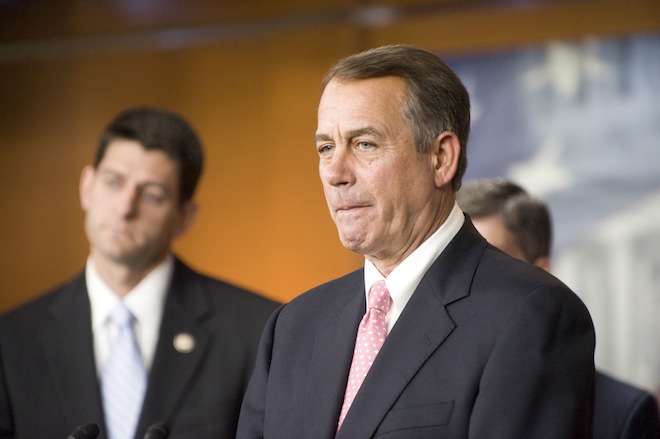Having run and lost on their central anti-tax stance, and with an austerity bomb nearing detonation, Republicans are softening their tone on the issue. But what may appear to be a meaningful shift on taxes among GOP leaders is belied by the unchanged policy specifics within the rhetoric.
“For the purposes of forging a bipartisan agreement that begins to solve the problem, we’re willing to accept new revenue under the right conditions,” said House Speaker John Boehner (R-OH) in a post-election press conference.
That leaves the impression that Republicans are willing to raise revenue by limiting deductions and loopholes. Correct, but they’ve always been open to that — if and only if the new revenue is used to lower tax rates rather than reduce the deficit. Look closer and it’s apparent that that stance is still the same.
“What matters is where the increase revenue comes from and what type of reform comes with it. Does the increased revenue come from government taking a larger share of what the American people earn through higher tax rates?” Boehner said. “Or does it come as a byproduct of growing our economy, energized by a simpler, cleaner, fairer tax code, with fewer loopholes and lower rates for all?”
The backstory is that Republicans were pilloried last year for scorched-earth opposition to new taxes that nearly led to a U.S. debt default. Their approval rating took a beating and credit rating agencies blamed a downgrade on the GOP-incited ugly debt ceiling standoff. In response, the party began accompanying its rhetoric against tax hikes with a proactive push for “tax reform” — but always in the context of revenue neutrality, a principle that Republican presidential nominee Mitt Romney also touted throughout his campaign.
Rep. Tom Price (GA), an influential conservative and GOP leadership member, added some clarity to that stance on Sunday. Appearing on CNN’s “State of the Union,” he said, “We need to look at increasing revenue through pro-growth policies as well as tax revenue.”
What does that mean?
“Tax revenue,” Price explained, “which means broadening the base, lowering the rates, closing the loopholes, limiting the deductions, limiting the credits, and making certain that we identify the appropriate spending reductions so that we have, indeed, a balanced approach.”
That “balanced approach,” he said, involves a “process of tax reforms and spending reductions.” In other words: new revenue is acceptable to Republicans only if it comes from economic growth through reforms that lower rates and hold net taxes constant — a notion for which there is little evidence — as well as federal spending cuts.
“Tax reform, done in the manner I’ve described, will result in the additional revenue the president seeks,” Boehner said. “It will support economic growth, which means more revenue is generated for the Treasury.”
Another hint that Republicans still oppose revenue-raising reforms: leaders from Boehner to Senate Minority Leader Mitch McConnell (R-KY) repeatedly invoke the bipartisan tax reforms of 1986, which were crafted to hold revenue neutral, as the model to follow.
The gentler rhetoric helps Republicans appear as though they’re compromising on tax revenues. Their rigid stance has become harder to sustain in the wake of a resounding electoral defeat. But the political forces within their base that compel elected Republicans to fight against tax hikes are as committed as ever. Grover Norquist is reiterating that a net tax increase achieved by closing loopholes would violate his anti-tax pledge that most Republicans remain beholden to. Conservative activists are renewing threats to primary any lawmaker who compromises on higher taxes. Boehner risks a conservative mutiny against his speakership if he fails to hold the line or convince his party base otherwise.
More broadly, conservatives oppose tax hikes because their long-term goal is to shrink the size of government. Increasing federal revenues diminishes the need to cut domestic spending on programs such as food stamps, Medicare and Social Security.
“Tax increases to chase ever higher spending,” declared Price, “is a fool’s errand.”
For Democrats, revenue neutrality negates the purpose of tax reform, which is to help reduce the deficit. If President Obama refuses to back down, Republicans may be forced to swallow a bitter pill on their defining issue. But for now, the change in the way the GOP talks about taxes should not be misinterpreted as a new-found openness to raising them. The policy substance beneath the party’s gentler rhetoric on taxes is the same as it ever was.










